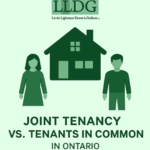
The “Reading of the Will” is a Myth – And Why That Matters for Your Family
July 24, 2025
Joint Tenancy vs. Tenants in Common in Ontario — What’s the Difference and Why It Matters
November 4, 2025How to Avoid Probate Tax in Ontario Without Expensive Mistakes
If you’ve ever typed how to avoid probate tax in Ontario into Google, you’ve likely found no shortage of “tips” and “hacks.” Joint ownership. Gifts. Trusts. Transfer everything to your child by bedtime, before the government gets everything.
Several times a week, clients tell us about a magical solution they’ve heard from a neighbour, someone at church, an uncle, or even a stranger at a coffee shop.
Here’s the truth: yes, there are legitimate ways to reduce or avoid probate. But in many cases, the risks, costs, and headaches of those strategies can outweigh the actual tax. Sometimes, the cure is more expensive than the disease.
First Things First: What Is Probate Tax?
Probate tax in Ontario (formally called the Estate Administration Tax) is a fee paid to the province when an estate is probated. The rate is roughly 1.5% of the estate’s value over $50,000. That means on a $500,000 estate, probate tax is roughly $7,000. Not pocket change, but also not the villain some people make it out to be.
This is why it’s important to do the math before building elaborate structures to avoid it. Seven thousand dollars may sound big, but not when compared to tens of thousands in legal fees, family disputes, or unintended tax consequences.
Common Probate Avoidance Strategies (and Their Pitfalls)
Joint Ownership
Adding your child (or anyone else) as a joint owner on your home or bank account can avoid probate tax. But it also means they legally own part of your property now. Want to refinance or sell the house? Better hope your child’s marriage is solid and their creditors aren’t circling. Otherwise, your probate “savings” may turn into a courtroom disaster.
Gifting Assets Before Death
Giving away assets before you die can shrink your estate and reduce probate fees. One obvious point to remember is to ensure you have enough in assets to sustain yourself for the rest of your life. You may not want to jeopardize your life savings to save 1.5% in tax. But don’t forget about the capital gains tax on certain gifts as though you sold the asset. That means you could create a bigger tax bill than the probate tax you were trying to avoid. Ouch.
Multiple Wills
For business owners, multiple wills can be a great tool. One will governs assets requiring probate (like most real estate), and another covers private company shares that don’t. This can work well—but it requires careful drafting and ongoing maintenance.
Trusts
A trust can keep assets out of probate, and many clients think a trust is an easy way to avoid tax. Except trusts require set-up costs, annual tax filings, and ongoing administration. Unless you have significant wealth, a trust may end up costing far more than the probate tax you were trying to dodge.
When Avoiding Probate Doesn’t Make Sense
Here’s the part few people tell you: sometimes the most efficient, cost-effective option is just to go through probate and pay the tax.
Probate gives your executor clear authority, reduces the chance of disputes, and provides legal protection. It’s a bit of paperwork and a fee to the province—but it can save your family years of infighting and legal expense.
In other words: saving on probate can sometimes be an expensive way to save money.
The Bottom Line
Probate tax in Ontario is real, and sometimes planning around it is wise. But avoiding probate at all costs? That can backfire.
The smarter approach is balance: look at the size of your estate, your family dynamics, and your long-term goals. Then decide whether strategies like joint ownership, trusts, or multiple wills make sense—or whether probate itself is the simpler, safer path.
At Levitt, Lightman, Dewar & Graham LLP (LLDG), we help clients in Etobicoke and across Ontario navigate this decision with clarity, and the occasional harsh dose of honesty. If you’d like advice tailored to your situation, give us a call. We’ll help you decide whether avoiding probate tax is worth it, regardless of what you overheard at the coffee shop.



